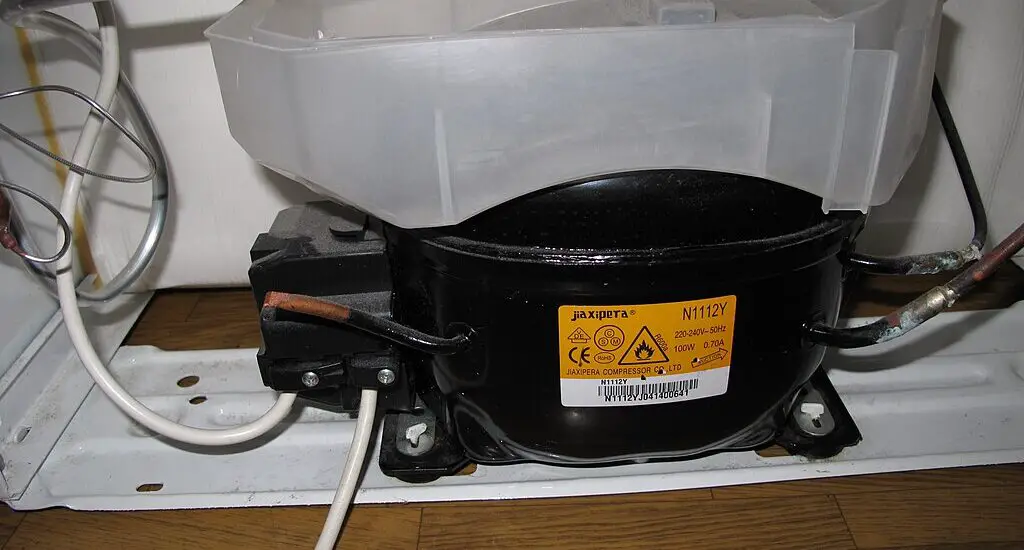If your refrigerator compressor is too hot, it’s important not to ignore the issue. In this article, you will find a comprehensive, step-by-step guide to help you diagnose and resolve the problem.

Table of Contents
Common Reasons Why Your Refrigerator Compressor Is Too Hot
The following are the common reasons why your refrigerator compressor is too hot.
Insufficient Ventilation
A refrigerator needs space around it to allow heat to disperse. If your fridge is squeezed into a tight space or pressed against a wall, the heat generated by the compressor cannot escape, causing it to overheat. It’s crucial to maintain at least a one-inch gap between the fridge and surrounding walls or objects.
Dusty or Dirty Coils
The condenser coils dissipate the heat pulled from inside the fridge into the room. When dust accumulates on these coils, they become less efficient at dissipating heat, causing the compressor to work harder and get hotter. Regular cleaning can mitigate this issue.
Electrical Issues
Faulty wiring, worn-out terminals, or issues with electrical components can compromise the efficiency of the compressor. These electrical problems often require specialized knowledge to diagnose and fix, and they can cause the compressor to draw more power and overheat.
Required Tools to Fix a Hot Compressor
Before attempting to fix the problem, you’ll need to diagnose it properly. You’ll need a few simple tools for this step.
A thermometer: To measure the exact temperature of the compressor.
A flashlight: To help you see in dark or less illuminated areas behind or beneath the refrigerator. You can get this Ozark Trail Single Mini Handheld LED Flashlight from Walmart.
A screwdriver: To open any panels or compartments.
Check out these other articles…
Do Refrigerator Compressors Have a Reset Button? Answered
Refrigerator Compressor Does Not Shut Off: 3 Causes & Fixes
Does a Refrigerator Compressor Make Noise? Detailed Answer
How Does a Compressor Work in a Refrigeration System?
Bad Smell From Refrigerator Compressor: 3 Causes & Fixes
Roaches in Refrigerator Compressor: Proven Elimination Steps
Refrigerator Compressor is Too Hot Solution Steps
If you’ve identified that your refrigerator’s compressor is too hot, follow these steps carefully. Each step is crucial to diagnosing and fixing the issue.
Switch Off the Refrigerator: Safety comes first. Turn off your fridge by unplugging it from the electrical outlet. Never attempt to troubleshoot or fix anything while the appliance is connected to electricity.
Check Ventilation: Using a measuring tape, confirm that there’s at least a one-inch gap on all sides of your refrigerator. If not, move the refrigerator away from walls or other obstructions. This step ensures proper air circulation, reducing the risk of overheating.
Clean the Coils: The condenser coils are usually located at the back or the bottom of your refrigerator. You will likely need to remove a back panel using a screwdriver. Once accessible, use a soft-bristle brush or a vacuum cleaner with a brush attachment to gently clean the coils. Make sure to remove all visible dust and debris. Replace the back panel once you’re done.
Inspect Electrical Components: Use a flashlight to carefully inspect the area around the compressor for any signs of frayed wiring, burned areas, or other electrical issues. If you notice anything that looks out of place, do not attempt to fix it yourself; electrical repairs should only be done by qualified professionals.
Consult a Professional: If you’ve tried all the above steps and the issue persists, the problem might be more complex than it appears. In such a case, don’t hesitate to contact a certified technician. A malfunctioning compressor can lead to spoilage of food and even pose safety risks, so professional consultation is advised.